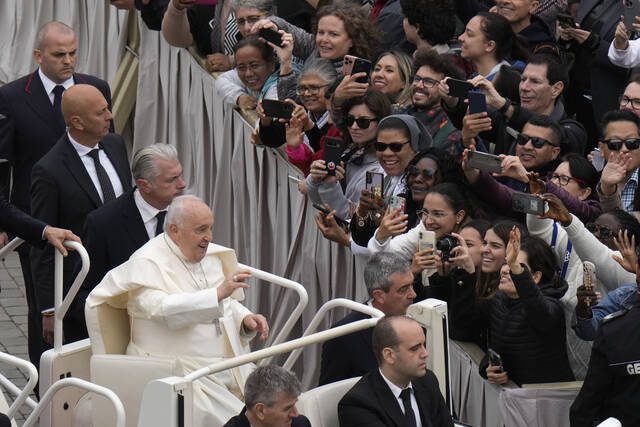Pope Francis recovered from respiratory problems to oversee Easter celebrations, urging a cease-fire in Gaza and a prisoner swap between Russia and Ukraine.
Francis led Easter Sunday Mass in a flower-filled St. Peter’s Square and then offered a sincere prayer for peace amidst global crises.
“Peace is achieved not through weapons, but through open hands and hearts,” Francis stated to applause from the crowd below.
Despite celebrating the long Easter Vigil just hours earlier, Francis seemed well, despite suffering from respiratory issues all winter. His full participation in Easter services was uncertain, especially after skipping the traditional Good Friday procession.
However, he made several rounds in his popemobile after Mass, greeting well-wishers, indicating he was feeling fine.
Around 60,000 people attended the Mass, with more filling the leading boulevard. A gust of wind knocked over a large religious icon at the start of the service, but it was quickly righted.
Easter Mass is a significant event in the liturgical calendar, marking Jesus’ resurrection. The Mass precedes the “Urbi et Orbi” (to the city and the world) blessing, during which the pope traditionally lists the threats facing humanity.
This year, Francis expressed concern for those in Ukraine and Gaza, especially the children who have “forgotten how to smile.”
He urged the release of prisoners taken from Israel on Oct. 7, an immediate cease-fire in Gaza, and access for humanitarian aid to reach Palestinians.
He called for the swift release of prisoners taken from Israel on Oct. 7, an immediate cease-fire in Gaza, and humanitarian access to reach Palestinians.
He emphasized the importance of halting the hostilities to prevent severe impact on the civilian population and children, and also mentioned the plight of Haitians, the Rohingya, and victims of human trafficking.
In recent weeks, Francis has avoided lengthy speeches to ease the strain on his breathing, skipping his Palm Sunday homily and the Good Friday procession at the Colosseum.
The Vatican explained that the decision was made to “preserve his health.”
The decision paid off, as Francis was able to lead the lengthy Saturday night Easter Vigil service, administer sacraments to eight new Catholics, oversee Easter Sunday Mass, and deliver his speech.
Francis was not the only leader whose presence at Easter was a comforting sign of stability and normality.
In Britain, King Charles III went out in public for an Easter service at Windsor Castle, marking his most significant public appearance since being diagnosed with cancer last month.
The king greeted spectators with a cheerful wave as he entered St. George's Chapel, and then spent time shaking hands and greeting well-wishers after the service. He told them, “You’re very brave to stand out here in the cold.”
However, things were far from normal in Jerusalem during Easter Mass at the Church of the Holy Sepulcher. Only a small number of faithful people attended the service while the Israel-Hamas war continued in Gaza.
The historic church in the Old City is the sacred place where Christians believe Jesus was crucified, buried, and then resurrected.
In previous years, the church was filled with worshippers and tourists. But due to the ongoing conflict in Gaza, which has been happening for six months, there has been a significant decrease in tourism and pilgrimages across Israel and the Palestinian territories.
The streets of the old city were also empty of Palestinian Christians from the West Bank, who usually gather in the city for Easter. Since the conflict started, Palestinian worshippers from the Israeli-occupied territory have required special permission to cross checkpoints into Jerusalem.
In Gaza, the situation was similarly grim. Only a few dozen Palestinian Christians observed Easter Mass at the Holy Family Church in Gaza City, but there was not much to rejoice about.
“This doesn’t feel like Easter, like other times,” said Winnie Tarazi, a Christian from Gaza City. “It’s because we are here deprived of our homes, our belongings, our children, and everything. We lost our family between those who fled, who stayed, and who were destroyed.”
In Iraq’s Nineveh Plains, hundreds of people celebrated Easter in a region that has had a Christian presence since around the time of Jesus, despite the killings and displacements by the Islamic State group 10 years ago. The Christian community in Iraq, which used to be about 1.5 million strong, now numbers only a few hundred thousand.
“We will definitely stick to this land and remain here until the last, and hope for a change,” said Nassar Mubarak, who attended Easter Mass at the Immaculate Conception church in Qaraqosh.



